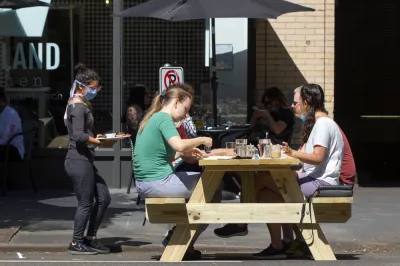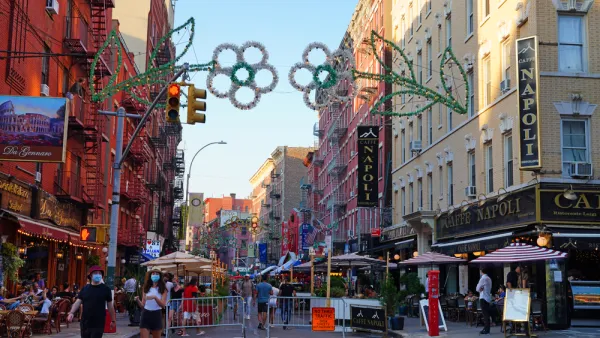The geography for the coronavirus has changed, but most of the debate about the future of cities continues along many of the same lines as in the early months of the pandemic.

By now you know how the tragic and terrifying experiences of Spring 2020 in New York City produced a cottage industry of urbanism punditry. Streets and offices emptied as millions stayed home. Some unspecified but widely reported number of New Yorkers decamped to less urban climes, and some in the media were so bold as to predict the demise of the city as we know it. Others in the media held fast to historic precedent: cities had outlasted worse afflictions before, and would offer economic and social benefits in any future economic recovery. This setback would only precede another comeback, and the first signs of that future recovery were already apparent, according to the pro-urban argument.
Planetizen has been documenting the debate about the future of urbanism, planning, transportation, etc., throughout the pandemic, so far sharing three separate compendiums of articles on the subject, with many more examples mixed in over the course of the year.
- Debating the Future of Cities After the Coronavirus, Volume 3 (June 2020)
- Density Debate Rages Alongside the Pandemic (April 2020)
- Debating the Future of Cities, and Urban Density, After the Pandemic (March 2020)
- Coronavirus and Density (Planetizen Tag)
- Coronavirus and Urbanism (Planetizen Tag)
- Coronavirus and Transportation (Planetizen Tag)
Now, fourth months later, the story of the coronavirus in the United States has changed geographies, if not demographics. While the nation watched Black Lives Matter protests in cities from coast to coast, and wrestled with the responses of first local and then federal police forces, the spread of the coronavirus slammed to a near halt in New York City. The nation's most populous city now seems placid in comparison to the everything below the Mason Dixon line, all the way across the United States. Arizona, Texas, and Florida are among the states experiencing the worst the coronavirus has thrown at humanity for over a month now. With this shift in geography came a political shift—governors doing victory laps in April and pushing, along with President Trump, to reopen, have been humbled (in their neighbors' eyes, if not their own).
Meanwhile, low-income and people of color continue to experience the worst outcomes of the pandemic, in both economic and public health terms. Other realities of the pandemic haven't changed, like the debate about the future of urbanism. With New York City's recent, relative salubriousness, it could be that pundits and residents, unable to flee the virus's reach in their vacation homes, might have changed their tune.
But the debate continues. Despite evidence for months that it's not density, but crowding, that encourages the coronavirus to achieve its most infectious potential, the terms of the debate haven't really changed. It's true that cities of all sizes are less car-centric than they were before, more people are staying at home to work for the foreseeable future, and a new generation of planners are pointing out shortcomings of racial and social justice in ostensibly progressive causes, but the cottage industry of urbanism punditry during the pandemic is still mostly contesting this ground on the same terms. The same risks remain as well, none really solved with any long-term resolution: tens of millions are on the brink of eviction or foreclosures; schools are too unsafe too open, hindering parents in the job market; the 2020 Census is just one example of a democracy under siege; and the number of Americans dying everyday from COVID-19 surpassed 1,000 last week for the first time since late May.
The coronavirus still rages uncontrolled in too much of the country to assume we've heard the final word on the pandemic's big urbanism debate. Be sure that if you have settled on an opinion in this debate, many still disagree with you, and some of your opponents are online right now, trying to persuade more to their cause.
- Life after COVID: Europeans want to keep their cities car-free (Politico, June 11, 2020)
- How to suture a Dallas divided by racism (The Dallas Morning News, June 12, 2020)
- Opinion: To fix our cities, we must reckon with our racist urban past (The Washington Post, June 12, 2020)
- The Cloud over the Future of America’s Downtowns (Governing, June 15, 2020)
- Protests, public space and the remaking of cities (Rice Kinder Institute for Urban Research, June 15, 2020)
- The High Cost of Panic-Moving (The Atlantic, June 15, 2020)
- Urban Living Might Just Survive Coronavirus (Bloomberg CityLab, June 15, 2020)
- OPINION: We must invest in cities for a stronger global economy (Thomas Reuters Foundation News, June 16, 2020)
- Public Transport After COVID-19 Lockdowns: It’s Time to Innovate and Change Benchmarks of Success (TheCityFix June 16, 2020)
- Pandemic Travel Patterns Hint at Our Urban Future (Bloomberg CityLab, June 18, 2020)
- This Is Not the End of Cities (Bloomberg CityLab, June 19, 2020)
- How the Coronavirus Recovery Is Changing Cities (Bloomberg CityLab, June 22, 2020)
- Paying Remote Workers to Relocate Gets a Pandemic-Era Boost (June 23, 2020)
- The Destiny of Density (Lincoln Institute of Land Policy, June 24, 2020)
- The Lasting Normal for the Post-Pandemic City (Bloomberg CityLab, June 24, 2020)
- What Does Our Current Moment Mean for Cities in the Longer-Term? (Notes From the Underground, July 1, 2020)
- The Post-Planning Pandemic (Democracy, July 2, 2020)
- The Forces That Will Reshape American Cities (Bloomberg CityLab, July 2, 2020)
- Connecticut Bet Big on the Suburbs. That Might Finally Pay Off. (The Wall Street Journal, July 12, 2020)
- New York's desirability may be dropping—if only temporarily (Crain's New York Business, July 13, 2020)
- How the ‘15-Minute City’ Could Help Post-Pandemic Recovery (Bloomberg CityLab, July 15, 2020)
- The world’s mayors want a pandemic recovery that takes cars off the streets (The Grist, July 15, 2020)
- All These Stories About People Fleeing Cities Are Total Nonsense (Curbed, July 13)
- Coronavirus Threatens the Luster of Superstar Cities (The New York Times, July 21)
- Reimagining urban environments post-pandemic (YaleNews, July 21, 2020)
- Cars have run their course in U.S. cities. Here’s what’s next (Fast Company, July 22, 2020)
- City leaders fear urban flight gaining momentum (Crain's New York Business, July 22, 2020)
- New Yorkers ditching city for more elbow room fuel housing boom (Associated Press, July 22, 2020)
- I Moved Home When Coronavirus Hit. I Might Never Come Back to New York. (Curbed, July 22, 2020)
- Goodbye, Washington, DC. (Human Events, July 23, 2020)
- The Pandemic and the Suburbs’ Second Chance (Governing, July 23, 2020)
- Why urban density is good for health – even during a pandemic (The Conversation, July 24, 2020)
- The Virus Turns Midtown Into a Ghost Town, Causing an Economic Crisis (The New York Times, July 26, 2020)
- Covid-19 will change the way we live as older adults (Quartz, July 26, 2020)

Analysis: Cybertruck Fatality Rate Far Exceeds That of Ford Pinto
The Tesla Cybertruck was recalled seven times last year.

National Parks Layoffs Will Cause Communities to Lose Billions
Thousands of essential park workers were laid off this week, just before the busy spring break season.

Retro-silient?: America’s First “Eco-burb,” The Woodlands Turns 50
A master-planned community north of Houston offers lessons on green infrastructure and resilient design, but falls short of its founder’s lofty affordability and walkability goals.

Test News Post 1
This is a summary

Analysis: Cybertruck Fatality Rate Far Exceeds That of Ford Pinto
The Tesla Cybertruck was recalled seven times last year.

Test News Headline 46
Test for the image on the front page.
Urban Design for Planners 1: Software Tools
This six-course series explores essential urban design concepts using open source software and equips planners with the tools they need to participate fully in the urban design process.
Planning for Universal Design
Learn the tools for implementing Universal Design in planning regulations.
EMC Planning Group, Inc.
Planetizen
Planetizen
Mpact (formerly Rail~Volution)
Great Falls Development Authority, Inc.
HUDs Office of Policy Development and Research
NYU Wagner Graduate School of Public Service




























